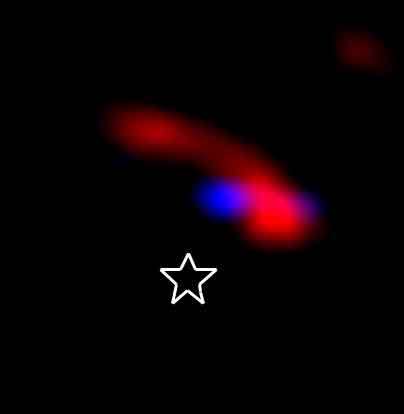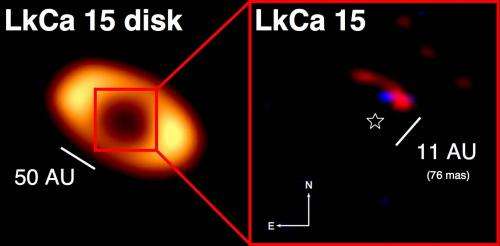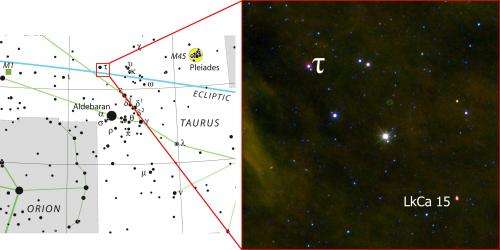Youngest planet seen as it's forming

(PhysOrg.com) -- The first direct image of a planet in the process of forming around its star has been captured by astronomers who combined the power of the 10-meter Keck telescopes with a bit of optical sleight of hand.
What astronomers are calling LkCa 15 b, looks like a hot “protoplanet” surrounded by a swath of cooler dust and gas, which is falling into the still-forming planet. Images have revealed that the forming planet sits inside a wide gap between the young parent star and an outer disk of dust.
“LkCa 15 b is the youngest planet ever found, about 5 times younger than the previous record holder,” said astronomer Adam Kraus of the University of Hawaii’s Institute for Astronomy. “This young gas giant is being built out of the dust and gas. In the past, you couldn’t measure this kind of phenomenon because it’s happening so close to the star. But, for the first time, we’ve been able to directly measure the planet itself as well as the dusty matter around it.”

Kraus will be presenting the discovery at an Oct. 19 meeting at NASA’s Goddard Space Flight Center. The meeting follows the acceptance of a research paper on the discovery by Kraus and Michael Ireland (of Macquarie University and the Australian Astronomical Observatory), in The Astrophysical Journal (available at arxiv.org/abs/1110.3808 )
The optical sleight of hand used by the astronomers is to combine the power of Keck’s Adaptive Optics with a technique called aperture mask interferometry. The former is the use of a deformable mirror to rapidly correct for atmospheric distortions to starlight. The latter involves placing a small mask with several holes in the path of the light collected and concentrated by a giant telescope. With that, the scientists can manipulate the light waves.
“It’s like we have an array of small mirrors,” said Kraus. “We can manipulate the light and cancel out distortions.” The technique allows the astronomers to cancel out the bright light of stars. They can then resolve disks of dust around stars and see gaps in the dusty layers where protoplanets may be hiding.

“Interferometry has actually been around since the 1800’s, but through the use of adaptive optics has only been able to reach nearby young suns for about the last 7 years.” said Dr. Ireland. “Since then we’ve been trying to push the technique to its limits using the biggest telescopes in the world, especially Keck.”
The discovery of LkCa 15 b began as a survey of 150 young dusty stars in star forming regions. That led to the more concentrated study of a dozen stars.
“LkCa 15 was only our second target, and we immediately knew we were seeing something new,” said Kraus. “We could see a faint point source near the star, so thinking it might be a Jupiter-like planet we went back a year later to get more data.”
In further investigations at varying wavelengths, the astronomers were intrigued to discover that the phenomenon was more complex than a single companion object.
“We realized we had uncovered a super Jupiter-sized gas planet, but that we could also measure the dust and gas surrounding it. We’d found a planet, perhaps even a future solar system at its very beginning” said Kraus.
Drs. Kraus and Ireland plan to continue their observations of LkCa 15 and other nearby young stars in their efforts to construct a clearer picture of how planets and solar systems form.
More information: The paper is available at arxiv.org/abs/1110.3808
Provided by W. M. Keck Observatory




















